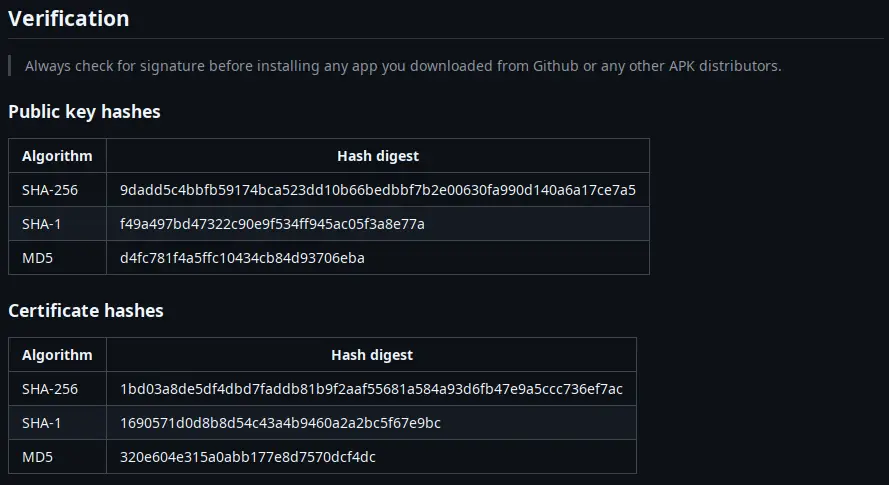How to verify signatures
Each APK published is signed by a set of signature. ONLY INSTALL from signatures listed in the post.
It is extremely important to verify signatures of each download you obtain from the internet.
❓ Why?
The signature in an APK is crucial for security, integrity, and trust. Here’s why:
- 🛡️ App Integrity – The signature ensures the APK has not been tampered with after being signed. If modified, the signature becomes invalid.
- 👤 Developer Identity – It verifies that the app comes from a trusted developer. Users and the Play Store can confirm that updates come from the same developer.
- ⏫ Update Verification – Android requires that app updates be signed with the same key as the installed version. This prevents unauthorized updates.
🛡️ App Integrity
Signature protects APK from being modified by bad actors. After an APK is signed, any modification to the APK will break the signature, thus, making the signature invalid. Learn more about APK signing process
👤 Developer Identity
Signature contains 2 keys, one public and one private.
- Public key is used for verification
- Private key can only be used to digitally sign the APK
In short, private key can generate signature that is encrypted and only corresponding public key can verify if the signature is valid.
In case of APK, signed .apk files contain public key hashes, which can be used to verify against public key hashes published by the developers.
⏫ Update Verification
For security reason, Android requires all APKs must be signed to be installed on your machine. Furthermore, update APKs require to have the same signature as the installed one.
For this reason, APK installed by APK distributor (such as FDroid, Google Play, etc.) cannot be install on the same machine (despite having the same appId).
🛠️ How can I verify your APK
Verify simple, each release post has a section called Verification, use this compare against
.apk file by following one of these methods below

Future posts should have the same hashes unless explicitly stated that they are different.
Next step is to obtain a copy of .apk file and follow one of these steps
By using apksigner
apksigner is an application provided by Google to developers to sign their apps, but you can use it verify .apk file too.
This is not a easy task, Google makes you jump hoops, and steers you to installing Android Studio instead. But Android Studio is not something you need for verifying signature of an APK file.
1. Download "Command line tools only"
We have separate instructions on how to install "buildtools", read it.
3. Verify signature
After all of that, apksigner is now available at [sdk_root]/build-tools/35.0.0/apksigner
Now, execute this command to get all signatures and more:
- Linux/Mac
[sdk_root]/build-tools/35.0.0/apksigner verify -v /path/to/Kreate-minified.apk - Windows
[sdk_root]\build-tools\35.0.0\apksigner verify -v /path/to/Kreate-minified.apk
A lot of lines will be printed out, but what we need lies up top, scroll up the terminal until you see
❯ [sdk_root]/build-tools/35.0.0/apksigner verify --print-certs -v /path/to/Kreate-minified.apk
Verifies
Verified using v1 scheme (JAR signing): true
Verified using v2 scheme (APK Signature Scheme v2): true
Verified using v3 scheme (APK Signature Scheme v3): true
Verified using v3.1 scheme (APK Signature Scheme v3.1): false
Verified using v4 scheme (APK Signature Scheme v4): false
Verified for SourceStamp: false
Number of signers: 1
Signer #1 certificate DN: C=US, ST=Texas, L=Houston, O=KnightHat, OU=Kreate, CN=Tan Nguyen
Signer #1 certificate SHA-256 digest: 1bd03a8de5df4dbd7faddb81b9f2aaf55681a584a93d6fb47e9a5ccc736ef7ac
Signer #1 certificate SHA-1 digest: 1690571d0d8b8d54c43a4b9460a2a2bc5f67e9bc
Signer #1 certificate MD5 digest: 320e604e315a0abb177e8d7570dcf4dc
Signer #1 key algorithm: RSA
Signer #1 key size (bits): 2048
Signer #1 public key SHA-256 digest: 9dadd5c4bbfb59174bca523dd10b66bedbbf7b2e00630fa990d140a6a17ce7a5
Signer #1 public key SHA-1 digest: f49a497bd47322c90e9f534ff945ac05f3a8e77a
Signer #1 public key MD5 digest: d4fc781f4a5ffc10434cb84d93706eba
In this tutorial, we only need to focus on 3 lines:
Signer #1 public key SHA-256 digest: 9dadd5c4bbfb59174bca523dd10b66bedbbf7b2e00630fa990d140a6a17ce7a5
Signer #1 public key SHA-1 digest: f49a497bd47322c90e9f534ff945ac05f3a8e77a
Signer #1 public key MD5 digest: d4fc781f4a5ffc10434cb84d93706eba
Now compare with public key hashes

If all digests are identical, you are safe to install the app.
- More than 1 signer
- Keys are not matched
Delete .apk immediately and report it HERE
🗝️ By using Java's keytool
So far, this is a more friendly way to verify signatures of
.apkfiles.
Java comes with keytool by default, the installation process is very straight forward.
Go to step 2
1. Install "Java"
We have separate instructions on how to install Java 21, read it.
2. Verify certificate
Unlike apksigner, you can't print public key hashes, but you can print certificate hashes.
Open your terminal (on Linux or Mac) or Command Prompt on Windows machines and type:
keytool -printcert -v -jarfile /path/to/Kreate-minified.apk
On Windows, replace / with \.
Replace /path/to/Kreate-minified.apk to path you saved .apk file to
This should be the outputs from the command above
❯ keytool -printcert -v -jarfile /path/to/Kreate-minified.apk
Signer #1:
Certificate #1:
Owner: C=US, ST=Texas, L=Houston, O=KnightHat, OU=Kreate, CN=Tan Nguyen
Issuer: C=US, ST=Texas, L=Houston, O=KnightHat, OU=Kreate, CN=Tan Nguyen
Serial number: 1
Valid from: Wed Mar 12 22:51:59 CDT 2025 until: Sun Mar 06 21:51:59 CST 2050
Certificate fingerprints:
SHA1: 16:90:57:1D:0D:8B:8D:54:C4:3A:4B:94:60:A2:A2:BC:5F:67:E9:BC
SHA256: 1B:D0:3A:8D:E5:DF:4D:BD:7F:AD:DB:81:B9:F2:AA:F5:56:81:A5:84:A9:3D:6F:B4:7E:9A:5C:CC:73:6E:F7:AC
Signature algorithm name: SHA256withRSA
Subject Public Key Algorithm: 2048-bit RSA key
Version: 1
Now compare it to published certificate hashes from release post.

You're right, but it's very simple to convert between formats.
Let's take 1 of each for comparison
- From release post
1690571d0d8b8d54c43a4b9460a2a2bc5f67e9bc - From
keytool16:90:57:1D:0D:8B:8D:54:C4:3A:4B:94:60:A2:A2:BC:5F:67:E9:BC
If you look closely, you'll see that keytool just prints a easier-to-read version of release post.
- Capitalize all characters in first hash and place colon (
:) on every third position. Or, - Remove all colon (
:) and decapitalize all characters in keytool's version generates the same result.
If all digests are identical, you are safe to install the app.
- More than 1 signer
- Keys are not matched
Delete .apk immediately and report it HERE